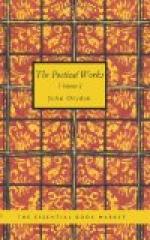430
It surely show’d he loved the shepherd well,
Who gave so fair a flock as Israel.
Would David have you thought his darling son?
What means he then to alienate the crown?
The name of godly he may blush to bear:
Is’t after God’s own heart to cheat his heir?
He to his brother gives supreme command,
To you a legacy of barren land;
Perhaps the old harp, on which he thrums his lays,
Or some dull Hebrew ballad in your praise. 440
Then the next heir, a prince severe and wise,
Already looks on you with jealous eyes;
Sees through the thin disguises of your arts,
And marks your progress in the people’s hearts;
Though now his mighty soul its grief contains:
He meditates revenge who least complains;
And like a lion, slumbering in the way,
Or sleep dissembling, while he waits his prey,
His fearless foes within his distance draws,
Constrains his roaring, and contracts his paws; 450
Till at the last his time for fury found,
He shoots with sudden vengeance from the ground;
The prostrate vulgar passes o’er and spares,
But with a lordly rage his hunters tears.
Your case no tame expedients will afford:
Resolve on death, or conquest by the sword,
Which for no less a stake than life you draw;
And self-defence is nature’s eldest law.
Leave the warm people no considering time:
For then rebellion may be thought a crime. 460
Avail yourself of what occasion gives,
But try your title while your father lives:
And that your arms may have a fair pretence,
Proclaim you take them in the king’s defence;
Whose sacred life each minute would expose
To plots, from seeming friends, and secret foes.
And who can sound the depth of David’s soul?
Perhaps his fear, his kindness may control.
He fears his brother, though he loves his son,
For plighted vows too late to be undone. 470
If so, by force he wishes to be gain’d:
By women’s lechery to seem constrain’d.
Doubt not; but, when he most affects the frown,
Commit a pleasing rape upon the crown.
Secure his person to secure your cause:
They who possess the prince possess the laws.
It surely show’d he loved the shepherd well,
Who gave so fair a flock as Israel.
Would David have you thought his darling son?
What means he then to alienate the crown?
The name of godly he may blush to bear:
Is’t after God’s own heart to cheat his heir?
He to his brother gives supreme command,
To you a legacy of barren land;
Perhaps the old harp, on which he thrums his lays,
Or some dull Hebrew ballad in your praise. 440
Then the next heir, a prince severe and wise,
Already looks on you with jealous eyes;
Sees through the thin disguises of your arts,
And marks your progress in the people’s hearts;
Though now his mighty soul its grief contains:
He meditates revenge who least complains;
And like a lion, slumbering in the way,
Or sleep dissembling, while he waits his prey,
His fearless foes within his distance draws,
Constrains his roaring, and contracts his paws; 450
Till at the last his time for fury found,
He shoots with sudden vengeance from the ground;
The prostrate vulgar passes o’er and spares,
But with a lordly rage his hunters tears.
Your case no tame expedients will afford:
Resolve on death, or conquest by the sword,
Which for no less a stake than life you draw;
And self-defence is nature’s eldest law.
Leave the warm people no considering time:
For then rebellion may be thought a crime. 460
Avail yourself of what occasion gives,
But try your title while your father lives:
And that your arms may have a fair pretence,
Proclaim you take them in the king’s defence;
Whose sacred life each minute would expose
To plots, from seeming friends, and secret foes.
And who can sound the depth of David’s soul?
Perhaps his fear, his kindness may control.
He fears his brother, though he loves his son,
For plighted vows too late to be undone. 470
If so, by force he wishes to be gain’d:
By women’s lechery to seem constrain’d.
Doubt not; but, when he most affects the frown,
Commit a pleasing rape upon the crown.
Secure his person to secure your cause:
They who possess the prince possess the laws.
He said, and this advice above the
rest,
With Absalom’s mild nature suited
best;
Unblamed of life, ambition set aside,
Not stain’d with cruelty, nor puff’d
with pride, 480
How happy had he been, if destiny
Had higher placed his birth, or not so
high!
His kingly virtues might have claim’d
a throne,
And bless’d all other countries
but his own.
But charming greatness since so few refuse,
’Tis juster to lament him than accuse.
Strong were his hopes a rival to remove,




